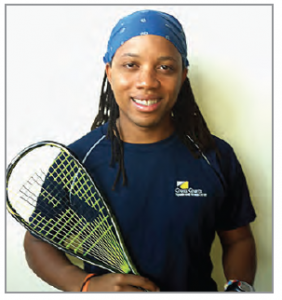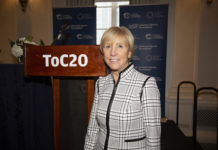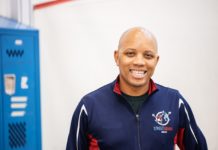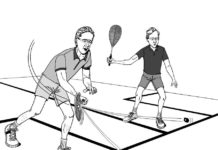
Simbarashe Muhwati, Assistant Pro, Squash Courts, Natick, MA
How did you get involved with squash?
My now late father Samson Muhwati is the reason I got into squash and is the reason I am still involved with it. As a kid he used to take me to a squash club in Zimbabwe called the Police Club, which was part of the athletic centre of the Zimbabwe Police force. The club had two courts and I remember getting there at 7am on Saturday with my dad to play an assortment of people. As I got older, if I did really well he would reward me with my favorite roast chicken and French fries from the club’s restaurant. Now that he is gone, I feel closest to him when I am out on the squash court with its distinct smell of warm rubber and wood.
Who was your first teacher?
My first teacher was losing, because as a 6-year-old kid I must have lost for 4 or 5 years straight. In terms of actual technique training I would have to say Graham Prior had the biggest influence on me in terms of the real basics of the game. In addition to him I had a lot of my father’s friends help me with the physical side of the game.
Did you play other sports?
I like saying that I play golf but that is more recreational than anything else. If I have the right collection of Pakistani’s, Indians, Zimbos and South Africans I can be tempted to play a little cricket as well.
Do you still compete?
No, not much these days I think I did enough competing in college and now I try to help young players learn the game and the life lessons that it provides.
Talk about your college squash experience at Trinity…and “The Streak”?
Those were the best four years of my life. However, they were filled with a lot of ups and downs, a major low would be learning about my father’s death in my dorm room in Hartford, CT and having to catch the next flight back to Zimbabwe.
Some of the highlights personally for me include meeting my wife Kathryn. I really enjoyed visiting and playing at some of the most prestigious institutions of learning in the world like Harvard, Princeton and Yale, which are truly mind blowing campuses. Trinity Squash is not a team, it’s a family, and Paul Assaiante is the father. When we played we played for our brothers that had been there before us like the Lefika’s, Osman’s, Smith’s, Samper’s, Malloy’s, Quick’s. Paul Assaiante, whom I consider my strongest current influence, did not hesitate to remind us of what those guys had done in their time and what it meant to represent this tiny liberal arts school of 2000 kids. I still believe the reason we won is that sense of family that Paul instilled, so if your brothers lost you had to fight back for them, case in point Gustav’s remarkable victory over Yasser. All in all we never talked about the streak, rather we tried to live and play like it was the last second on earth, for the moment. Live it 100mph “Paul Assaiante”.
Is this the year it (the streak) ends?
That is in the hands of the nine guys Paul selects to represent Trinity College. Those are the only people who can accurately answer that question; the rest of us can only speculate. I would like to say, however, in at least two of my years at Trinity we were not the better team on paper but we found a way.
What do you see as the keys to growing squash in the U.S.?
That’s a tough question to answer because the U.S is a very unique squash-playing nation. The major focus here is to get as good at squash as possible ‘til you are about 18 or 19 years in order to go to a great school. In contrast, in major squash playing countries, juniors know who is on the national team whereas here, if you ask a random kid who Julian Illingworth is (World No 28), there is a good chance they would not have a clue. In other major squash playing countries they look up to their national champions and try to emulate them. In that sense I think the squash culture is different here.
Among the other’s in the U.S., whom do you look to as the ideal teaching pro?
Dan Sharplin, my head pro, is a remarkable teaching pro as well as a top-class player whose work ethic is just off the charts. He seems to have an endless list of great junior/ collegiate players that he has worked with over the years. He has a taught me a lot about my own game as well as the way to approach the position of being a teaching pro. Paul Johnson has become a good source of advice and is another great teacher whose technical ability and clarity make him a special instructor. Chris Spahr at the University Club is the consummate City pro and runs a great program where there is a healthy balance in adult and junior play. Lefika Regonste in Baltimore seems to be consistently churning out a lot of very good junior players. Damon Leedale-Brown is well known for his prowess in the physicality, movement and agility side of the game. In my mind all these teaching pros are great at specific skill sets. So in order to be a better coach I try and take things from each one of them and incorporate them into my sessions with my players.
Who is your favorite PSA pro to watch?
That’s a 4-way tie between Hisham Ashour, Ramy Ashour, Karim Darwish and Shabana.
Do you follow any other sports?
Yes I do. Go NY GIANTS!!!, Kobe and Yankees!!!





